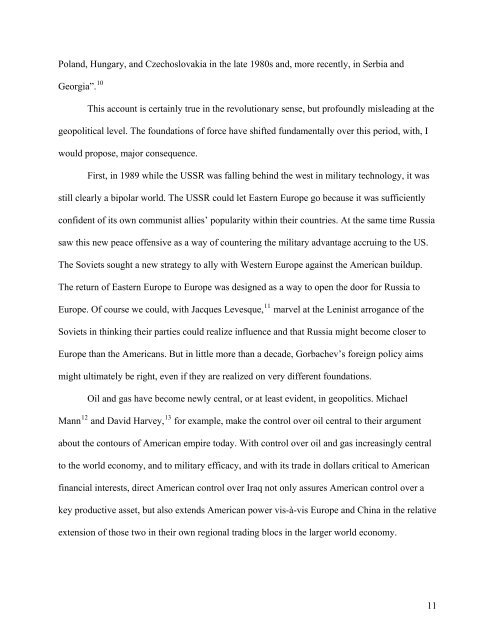from transition to hegemony - The Watson Institute for International ...
from transition to hegemony - The Watson Institute for International ...
from transition to hegemony - The Watson Institute for International ...
You also want an ePaper? Increase the reach of your titles
YUMPU automatically turns print PDFs into web optimized ePapers that Google loves.
Poland, Hungary, and Czechoslovakia in the late 1980s and, more recently, in Serbia and<br />
Georgia”. 10<br />
This account is certainly true in the revolutionary sense, but profoundly misleading at the<br />
geopolitical level. <strong>The</strong> foundations of <strong>for</strong>ce have shifted fundamentally over this period, with, I<br />
would propose, major consequence.<br />
First, in 1989 while the USSR was falling behind the west in military technology, it was<br />
still clearly a bipolar world. <strong>The</strong> USSR could let Eastern Europe go because it was sufficiently<br />
confident of its own communist allies’ popularity within their countries. At the same time Russia<br />
saw this new peace offensive as a way of countering the military advantage accruing <strong>to</strong> the US.<br />
<strong>The</strong> Soviets sought a new strategy <strong>to</strong> ally with Western Europe against the American buildup.<br />
<strong>The</strong> return of Eastern Europe <strong>to</strong> Europe was designed as a way <strong>to</strong> open the door <strong>for</strong> Russia <strong>to</strong><br />
Europe. Of course we could, with Jacques Levesque, 11 marvel at the Leninist arrogance of the<br />
Soviets in thinking their parties could realize influence and that Russia might become closer <strong>to</strong><br />
Europe than the Americans. But in little more than a decade, Gorbachev’s <strong>for</strong>eign policy aims<br />
might ultimately be right, even if they are realized on very different foundations.<br />
Oil and gas have become newly central, or at least evident, in geopolitics. Michael<br />
Mann 12 and David Harvey, 13 <strong>for</strong> example, make the control over oil central <strong>to</strong> their argument<br />
about the con<strong>to</strong>urs of American empire <strong>to</strong>day. With control over oil and gas increasingly central<br />
<strong>to</strong> the world economy, and <strong>to</strong> military efficacy, and with its trade in dollars critical <strong>to</strong> American<br />
financial interests, direct American control over Iraq not only assures American control over a<br />
key productive asset, but also extends American power vis-à-vis Europe and China in the relative<br />
extension of those two in their own regional trading blocs in the larger world economy.<br />
11
















